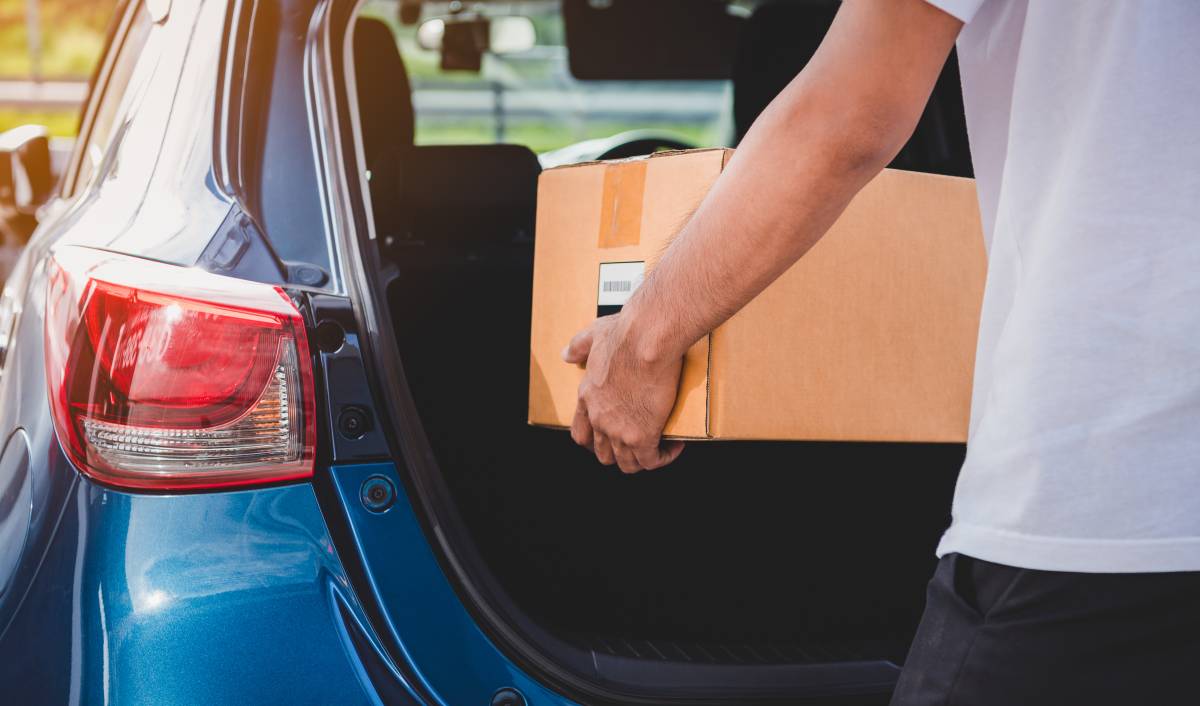
How to Make Money With Your Car in 2025
Learn practical steps, pricing tips, and smart ideas to start earning with your car in the UK.
Published on

Written by Angela A.
Staff Writer
Read more about our contributor
Key takeaways
39% of Brits now have a side hustle, with driving-based gigs becoming one of the most flexible income options.
You may need a private hire licence, courier or hire & reward insurance, and an MOT certificate to get started legally.
Popular car-based jobs include ridesharing, furniture delivery, airport transfers, and food or prescription delivery.
Side hustles are no longer the exception. They’re the norm. In 2025, 39% of Brits have a side hustle, with another 14% giving it a go even if it’s not profitable yet. In short, the appetite for extra income is real.
But while the options are plenty, not everyone can bake, sew, or start a podcast. So what if you already own something that can help? For many, figuring out how to earn money with your car is one of the most practical (and profitable) moves you can make, especially if you’re looking for flexibility and steady demand.
In this guide, we’ll break down how to get paid using your car—from delivery runs to local driving gigs and passive earning options—so you can pick the one that fits your lifestyle and income goals.
What should you know about earning money with your car?
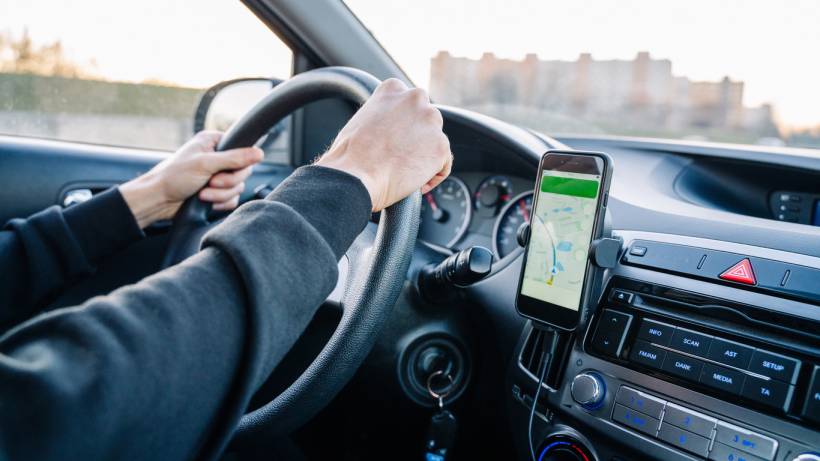 Using a smartphone for navigation. (Source: iStock)
Using a smartphone for navigation. (Source: iStock)
The gig economy in the UK has transformed cars from money-draining assets into potential earners. With the cost of living constantly rising, more Britons are getting jobs as drivers. Our internal data from the past three years confirms one thing: using your car to earn money remains a practical and in-demand option.
Pick up & Delivery: The most reliable income stream
Across all data points—yearly, quarterly, and monthly—pick-up and delivery tasks stand out as the most consistent and accessible car service category. Between 2022 and 2024, task volume nearly doubled, and average pay per task has remained strong. Offers per job rose to 3 per task, suggesting healthy demand and growing competition.
Even with a slight pricing dip in mid-2025, the market quickly rebounded, with June seeing a rise in closed prices to nearly £90 per task.
Whether you’re delivering groceries, parcels, or small furniture, this is a stable category for UK Taskers looking to make money with their car.
Transporting/Taxi services: Still a profitable option
While transport services experienced a sharp drop in 2024, recent quarters and months show signs of a comeback. The second quarter of 2025 alone saw a 50% rise in tasks and a surge in assigned pricing back up to £120 per job. Offers per task also increased, showing that more drivers are jumping back into this gig.
There’s still money to be made with transporting/taxi services, especially during high-demand months. However, be ready for market shifts and consider combining this with delivery work.
Courier gigs: Niche but has high potential
This lesser-known category saw an 800% increase in task volume in 2024 and continues to draw Tasker interest despite its lower frequency. In Q2 2025, average offers per task rose to nearly 5. However, lower rates are to be expected for simpler courier tasks.
Courier services can be incredibly lucrative, particularly for those who can offer secure or time-sensitive delivery. However, task volume is limited, so it’s best viewed as a supplement to your full-time work or car-service gig, not as a primary income stream.
Essential skills to get started and make money using your car in the UK
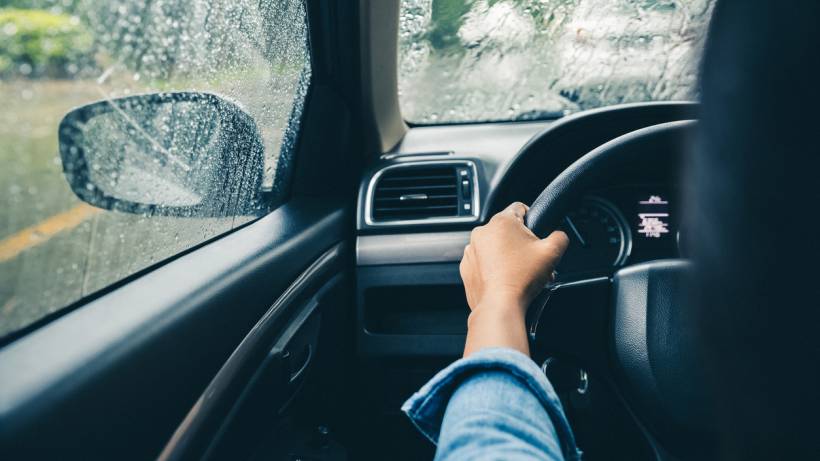 Driving in heavy rain. (Source: iStock)
Driving in heavy rain. (Source: iStock)
Essential skills
Driving for a living might sound simple, but to actually earn extra money with your car and keep the income flowing, there’s more to it than just having a licence. While you won’t always need formal driving lessons to build these habits, the skills below will help you stay safe, avoid penalties, and get consistent five-star ratings.
Safe and defensive driving skills and habits
Your driving style affects more than just your arrival time. It affects your earnings, safety, and platform status. Ridesharing apps often monitor driver behaviour through accident reports, cancellations, and rider feedback. A single reckless trip could get your account suspended or deactivated.
Defensive driving means anticipating hazards, keeping safe distances, and staying cool in traffic. It’s especially important if you’re transporting fragile goods.
Bonus: A clean driving record often means lower insurance premiums, which is a big win when you’re paying for private hire or courier cover.
Good interpersonal skills
Being friendly, clear, and professional goes a long way for rideshare and delivery jobs. Think: polite greetings, status updates, and respecting people’s time and property.
Whether you’re dropping off a package or giving someone a lift to the airport, a good impression often leads to repeat bookings, better tips, and glowing reviews.
Time management
The best gig drivers know how to work efficiently. Time management helps you line up jobs across different apps, take advantage of peak pricing, and avoid late arrivals that could hurt your reliability score.
Good navigation and route planning
Apps can help with navigation, especially if you’re not familiar with the area or your destination. Still, it’s essential to know your way around nearby areas and pay attention to road signs for unexpected road closures to plan ahead. Good route planning keeps you from getting lost, stuck in traffic, or taking a wrong turn into a zone that charges fees.
For drivers working on logistics, route planning also means avoiding narrow lanes, low bridges, or tricky loading spots, especially with larger or delicate items.
Basic vehicle troubleshooting
When your car is your job, every breakdown costs you money. Learning how to check your oil, change a tyre, jump-start a battery, or spot a warning light can save you time and stress.
Delivery and rideshare platforms won’t cover missed trips due to mechanical issues. Being self-reliant keeps you on the road and in control of your income.
Basic digital literacy
Every gig platform runs on apps. If you want to make money with your car, you’ll need to know how to install, navigate, and update them confidently.
You’ll also need to communicate clearly using in-app messaging, upload documents, understand your ratings, and respond to alerts about incentives or safety.
How to prepare and build your car-based income stream
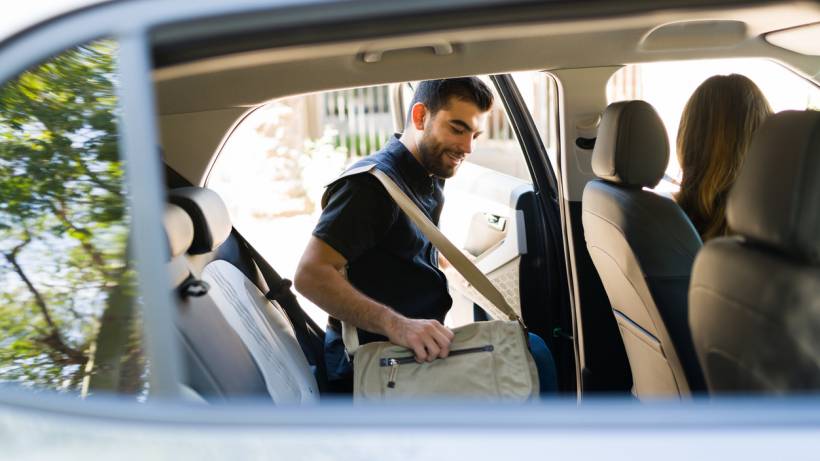 A passenger getting into the vehicle. (Source: iStock)
A passenger getting into the vehicle. (Source: iStock)
Knowing how to earn money with your car is one thing. Actually getting started is another. To turn your vehicle into a steady income stream, you’ll need to make a few decisions and tick off some setup steps first.
1. Decide how you want to use your car
Start by figuring out what kind of work makes the most sense for your schedule, vehicle and skills.
If you’ve got a clean, modern car, rideshare or peer-to-peer rentals might be a good fit. Got a van or larger boot space? Look into moving services or courier services that need extra capacity.
If you’d rather keep things low-contact, parcel drop-offs or prescription delivery gigs offer flexibility without too much interaction. For those with more time and a customer-friendly approach, jobs like pet transport or airport runs suit them better.
The goal is to match the work to how hands-on you want to be and what your car can handle. Once you’ve narrowed it down, research the right platforms. Choosing the right one early helps you avoid mismatched gigs and unnecessary delays.
2. Get your paperwork and legal documents in order
Before you can legally start, make sure your driving licence is valid and up to date. If you plan to drive a van or carry heavier loads, check if your licence class allows it. You’ll also need to confirm your vehicle’s tax status and registration with the Driver and Vehicle Licensing Agency (DVLA).
Next, sort your insurance based on the type of work you’ll do. Standard cover won’t cut it—you’ll need hire & reward, courier, or private hire insurance to stay compliant. If you're aiming to earn money with your car in London, you may also need a private hire licence and an enhanced DBS check, depending on the job.
Don’t forget your MOT if your car is over three years old. A failed or expired MOT can block you from most platforms. Keep both digital and physical copies of your documents so you’re ready for checks at any time.
3. Prepare and/or upgrade your vehicle
Your car needs to be reliable, efficient, and ready for the type of work you’re taking on. So, check your tyres, oil, brakes, lights, and wipers regularly.
Missing basic car servicing can lead to breakdowns or failed bookings. If your car burns through fuel or struggles with long drives, it might be time to upgrade.
Also, equip your car with the tools you’ll actually use, like a phone mount, charger, straps, or trolley, depending on the jobs you accept. A dashcam and tracking apps are often required or strongly recommended for delivery or transport work. These small additions help you stay safe, look professional, and avoid disputes.
If your interior’s damaged or worn, consider servicing your car for upholstery repair before offering passenger rides. For larger issues, book proper car repair work to avoid getting turned away by platforms.
4. Think about your business model
There are plenty of jobs you can do with your car in the UK, but not all of them will suit your goals or lifestyle. Some people stick to one platform, while others mix rideshare, delivery, and task-based apps to maximise income. You can also rent out your car or advertise on it for extra earnings during downtime.
If it’s available, use your preferred app’s analytics to spot your most profitable hours and build a routine that works for you. For example, you might take on food delivery during lunch, then switch to errands or transport jobs later in the day. If you’re planning to scale, think long-term—managing a fleet or flipping cars for profit comes with more rules and paperwork.
Whichever path you take, your business model should match your time, income goals, and how involved you want to be.
Factors that determine your rates and price your services
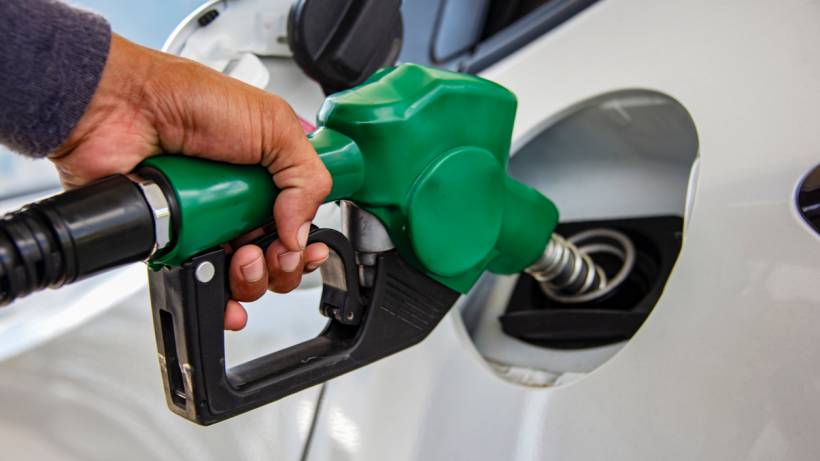 Refuelling the car at a service station. (Source: iStock)
Refuelling the car at a service station. (Source: iStock)
Setting the right prices to earn quick money with your car in the UK involves balancing what customers will pay with what you need to earn. Before listing your first job, consider these key factors that can affect your bottom line.
Fuel
Petrol or diesel costs add up quickly and vary based on your vehicle type, journey distance, and local prices. Use apps like Waze or Google Maps to estimate mileage before accepting jobs. Electric vehicle owners should also calculate charging costs and plan routes around charging points.
Time
Your time is valuable beyond driving hours. Factor in traffic delays, waiting time at pickups or restaurants, and delivery complexities. A 10-mile airport run might take 20 minutes at 5 am, but over an hour during rush hour.
Insurance
Standard car insurance won’t cover commercial use. You’ll need specific coverage depending on your work: courier insurance for parcels, hire and reward cover for goods, or private hire insurance for passengers.
Vehicle wear and tear (based on make and model)
Every mile you drive for work accelerates your car’s decline. Higher mileage means more frequent tyre replacements, brake servicing, oil changes, and faster depreciation. Your vehicle’s make and model also affect pricing: larger or premium vehicles justify higher rates but cost more to run.
Platform/service fees
Most gig platforms take a cut of your earnings. Always calculate your rates after these deductions, or you might end up working at a loss.
Pricing models you can offer
Hourly rate: Perfect for moving help or event transport, where time is the main factor.
Per trip rate: Ideal for airport transfers or fixed-route journeys.
Per mile rate: Common for courier work or long-distance transport.
Package deals: Great for regular clients or multi-stop jobs.
How to calculate your profit margins for your car-based services
Use this simple formula to track your actual earnings:
Profit = Total Earnings – (Fuel + Insurance + Maintenance + Fees + Taxes + Parking + Tolls) |
For example, if you earn £400 from deliveries in a week but spend £60 on fuel, £40 on insurance, £20 on maintenance reserves, £60 on platform fees, and £10 on parking, your actual profit is £210.
Keep detailed records of all expenses to understand your true hourly rate and identify the most profitable jobs or platforms.
How to price your services competitively
Start in the middle: When you’re new, don’t be the cheapest or the most expensive. Aim for the middle of the market until you build a reputation.
Add value instead of cutting prices: Offer extras like boot organisers for groceries or phone chargers for passengers rather than competing solely on price.
Create tiered pricing: Offer basic, standard, and premium options to capture different customer segments.
Adjust for time of day: Charge more during peak hours, weekends, or holidays when demand is higher.
Know your minimum: Calculate the absolute lowest rate you can accept while still making a profit, and never go below it—even for "exposure" or promises of future work.
Types of car-based services you can offer
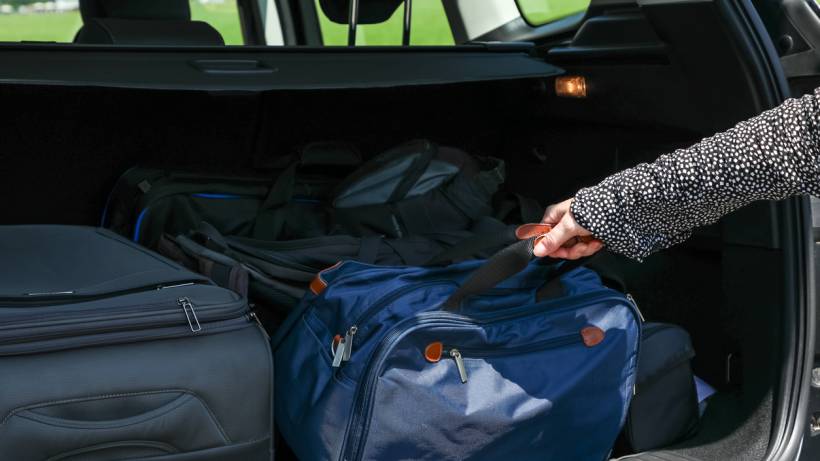 Putting luggage into the trunk of a car. (Source: iStock)
Putting luggage into the trunk of a car. (Source: iStock)
When thinking about how to make money with your car in the UK, you’ve got more options than just the obvious taxi work. Here are five profitable services you can launch with just your car and the right approach.
Rideshare driving
Turn your commute or free time into cash by connecting with passengers through Uber or Bolt. You’ll need proper licensing and insurance, but the flexibility is brilliant for fitting around existing commitments.
Drivers in the UK can make £16 to £30 hourly, with weekend nights bringing in even more. Focus on business commuters or use a fancier car to bump up your earnings.
Furniture delivery or removals
Got a spacious vehicle like a van or pickup truck? Help people move sofas, treadmills, or appliances through platforms like AnyVan, Shiply, or Airtasker.
You’ll need some basic equipment like straps and a trolley, plus a decent back for heavier items. But this service works brilliantly for flat moves, marketplace pickups, or office shifts. Emergency same-day moves or green options using electric vehicles can set you apart from the competition as well.
Long-distance private hire
Comfortable with motorway miles? Long-distance transfers between cities pay much better than local rides.
You’ll need the same licensing as regular private hire, but the rates are higher because of the distance involved. You can work through mainstream apps or market yourself for custom bookings. Offering extras like luxury vehicles, multi-stop journeys, or pet-friendly transport can attract premium clients.
Grocery or food delivery
Team up with Deliveroo, Uber Eats, or supermarkets like Tesco to deliver food and groceries locally. The hours are super flexible with busy periods during mealtimes and weekends.
You’ll need proper insurance and thermal bags, but almost any reliable car will do. Just invest in fuel-efficient or electric cars to keep costs down. Focusing on busy neighbourhoods or helping customers with special needs can boost your earnings.
Airport pickups and drop-offs
Airport transfers combine reasonable rates with the reliability of pre-booked journeys. However, you’ll need to be punctual and know your routes inside out. These jobs often include waiting time and luggage help as well, but this justifies charging more.
Extra touches like Wi-Fi, refreshments, or personalised greeting signs can help you stand out and earn better tips.
How to market your car-based services and find clients
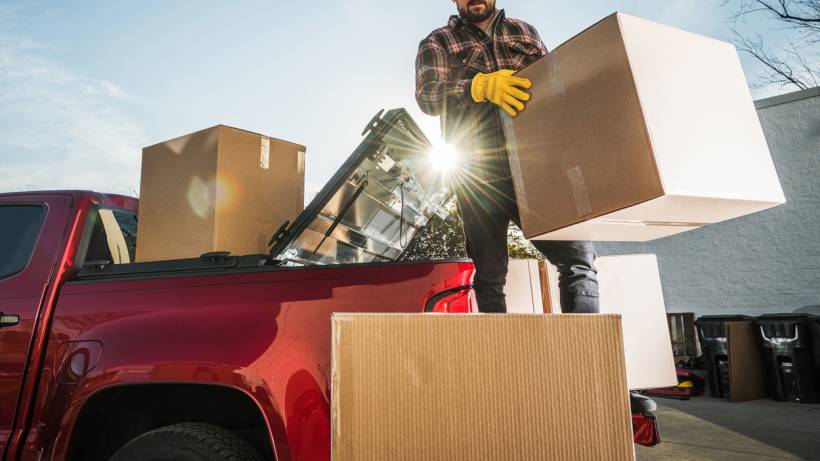 Boxes being loaded into the back of a pickup truck. (Source: iStock)
Boxes being loaded into the back of a pickup truck. (Source: iStock)
Even with the perfect vehicle and skills, you'll need to get the word out about your services to make money with a car. Here are the most effective ways to market yourself and find your first clients.
Freelance platforms
Digital marketplaces connect people who need transport services with those offering them. One such example is Airtasker.
It connects people needing things done to Taskers who can help them out for a set fee. For car owners, Airtasker connects drivers to people who need driving and delivery services. You get complete control over your schedule and can offer specialised services that big platforms don’t.
To start, create a profile showing off you and your vehicle, then bid on relevant jobs with your price. Customers will pick based on your ratings and response time.
Job ads or postings
Use Gumtree, Facebook Marketplace, and Nextdoor to promote your services locally. Make your listings detailed with examples of prices, areas you cover, and what your vehicle can handle. Update them regularly and respond quickly to messages.
Include testimonials to build trust. Put up physical ads in cafes, supermarkets, and community centres to reach people who aren’t always online.
Social media marketing
Create a dedicated business page on Facebook, Instagram, or WhatsApp Business with a catchy name like “Cambridge Courier Van” or “City Airport Transfers.” Share photos of successful jobs, update followers about your availability, and post customer reviews.
You can also join local community groups where people often ask for transport help. Use location-based hashtags to get noticed by people in your area who need your services.
Networking with local businesses and organisations
Build relationships with businesses that regularly need transport—estate agents, furniture shops, florists, and event planners make great partners. Here are some specific ideas:
Drop your business cards at car dealerships, rental agencies, and serviced apartments where customers might need a lift.
Contact care homes, schools, and small shops that could use reliable delivery options.
Pop into local business networking events to meet potential clients face-to-face.
Word-of-mouth referrals
Make every job count by being punctual, professional, and friendly. These small touches create lasting impressions.
If you have extra time and knowledge, start a referral programme with discounts for customers who bring you new business. Hand out business cards that people can easily pass along.
Basically, build a loyal base of repeat clients, especially for services like airport runs where trust matters. A personal recommendation carries more weight than any advert, particularly when it comes to transporting valuable items.
Drive carefully and learn as you go
Learning how to make money driving your own car in the UK has never been easier, with platforms connecting you directly to people who need your wheels and willingness. Your car isn’t just transportation anymore. It’s a ready-made business opportunity sitting in your driveway, waiting to turn those fuel expenses into profit instead.
On Airtasker, you simply spot a driving task that matches your vehicle and schedule, make an offer that works for you, and complete the job on your own terms. So, sign up and become a Tasker to find your next driving job today!
Learn more about our contributors

Written by Angela A.
Staff Writer
Angela Apolonio is an experienced writer with a Biology background. She writes about home tips, car upkeep, gardening hacks, and food facts, bringing a unique blend of science and practicality to her work. As a wife and a mother, she knows the value of iron-clad routines, so she's passionate about sharing what works for her with everyone else. She loves making everyday life simpler and helping readers find fresh ideas to bring more joy into their spaces.
FAQs on making money with your car
Unfortunately, carpooling isn’t always a sound way of making money with your car. Even in the UK, where it’s okay for car owners to charge people for rides, it’s unlikely you’ll make much money in excess of the petrol costs. The only payoff for carpooling in the UK is that you’ll be lowering your fuel expenses if you’re driving or lowering your fare if you’re a passenger. This practice may also lower emissions in your city.
There is no app in the UK that pays you only for driving. Most apps that involve driving your car require that you deliver services like transporting goods or ferrying passengers. Apps that perhaps come closest to that description are those offered by companies that do car advertising; you sign up your car, and the company pays you to place stickers or wraps on your vehicle, turning it into a moving advertisement.
You’ll need courier insurance (£1,000 to £2,000 annually or pay-as-you-go options), a DBS check (about £21.50), and a valid MOT certificate (£30 to £55). Budget another £100 to £200 for initial fuel and maintenance, plus equipment like a phone mount and thermal bags.
Working 10–15 hours weekly, you can realistically earn £120 to £250 per week (approximately £500 to £1,000 monthly). Food delivery pays £7 to £13 hourly (up to £15 during peak times), while courier services can offer a steady £13 to £15 per hour.
Yes, you must have a private hire licence issued by your local council. This licence requires an enhanced DBS check, medical examination, and proper insurance. It costs around £300-£500 and is valid for three years.
Only if you hold a Private Hire Vehicle licence and appropriate insurance. Without these credentials, charging for transport is illegal and can result in penalties, though you can still carpool with contribution-only payments or drive friends for free.
Create your profile and start browsing jobs in minutes
Start earning now